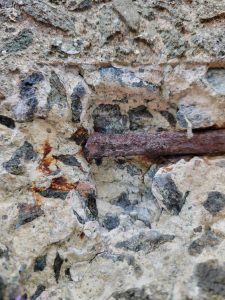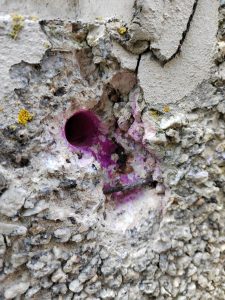What are Concrete Condition Surveys?
Concrete condition surveys are essential ground tests that provide an understanding of the extent of the damage a concrete surface may have sustained. These assessments will determine whether safe construction can take place on a site or whether corrective action is required beforehand. In this blog, we will discuss how concrete corrosion occurs, how to fix damaged concrete and what Concrete Condition Surveys entail.
Why does concrete corrosion occur?

Concrete corrosion is a natural phenomenon that occurs as a result of prolonged exposure to various elements. Most commonly, concrete may deteriorate due to carbonation and chloride attack.
Concerning concrete, carbonation is the reaction of carbon dioxide and hydrated calcium silicate. Carbon dioxide is abundant in the air, and when combined with the calcium silicate hydrates present in concrete, depletion of concrete quality will occur. Hydrated calcium silicate is primarily responsible for maintaining the structural integrity of the concrete. If compromised, carbonation causes the strength of the concrete to decrease. The concrete will be far more susceptible to cracking in this eventuality.
Furthermore, chloride attacks tend to occur in concrete that supports a metal structure exposed to water. Chloride attacks often happen in concrete submerged in water, such as beam supports in the ocean, as seawater contains excess chloride levels. The chloride doesn’t directly affect the concrete. But chloride can have a detrimental impact on the state of the metal, which will expand when submerged in water and cause cracking in the concrete foundations. The damaged concrete will become weaker over time and risk its structural integrity.
How is damaged concrete fixed?
Concrete, when more than an eighth of an inch wide, will require concrete repair mortar to fix, but this isn’t usually as simple as it sounds. Depending on the depth of the damage, sufficiently filling the crack with repair mortar can be difficult, and the structural integrity of the concrete will still be compromised. Additionally, the aggregate can often be too large for small gaps, and stones can prevent a clean finish. Smaller cracks in damaged concrete are easier to fix with an epoxy resin or latex patching product, but we recommend you have a professional fix your concrete to avoid making mistakes.
What happens during concrete condition surveys?
Here at Streval, to complete concrete condition surveys, we conduct visual and ground-penetrating radar surveys to determine the condition of the subsurface of concrete.
For visual surveys, we simply have our highly knowledgeable and experienced surveyors study the surface of and investigate the concrete to identify any potential issues.
Ground Penetrating Radar Surveys (GPR), on the other hand, are highly effective, non-destructive tests that use radiowaves to collect data of the ground below that indicate changes in the concrete, such as cracks, gaps, and splits. The obtained information will then be used to determine whether the intended project is safe and viable or whether the underground conditions will jeopardise it. We use guidance from the BRE and the Concrete society when conducting concrete condition surveys to ensure we adhere to current industry guidelines and standards.

To determine whether a carbonation or chloride attack has occurred, we conduct carbonation depth readings on a freshly broken portion of concrete and take dust samples to assess the degree of chloride ion ingress.
Furthermore, we evaluate the corrosion of any embedded reinforced steel that may be present to determine whether this is the source of the deterioration of the concrete. We do this using Half-Cell Corrosion Testing coupled with Concrete Resistivity, and in some cases, Linear Polarisation Resistance measurements. The combination of these tests allows us to gain a comprehensive understanding of the condition of the concrete and provide thorough reports to develop effective and affordable solutions.
For more information or to book a concrete condition survey contact the experts at Streval.
